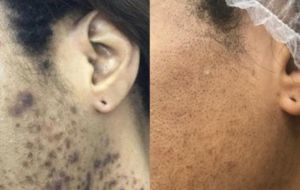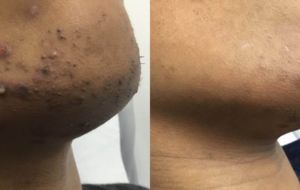Acanthosis Nigricans is a dermatological condition characterised by dark, thickened patches of skin, often with a velvety texture. This disorder typically manifests in areas with skin folds, such as the neck, armpits, groin, and knuckles. Acanthosis Nigricans result from an overproduction of skin pigment (melanin) and the subsequent thickening of the epidermis. While the condition itself is benign, it often serves as a visual indicator of an underlying health issue, such as insulin resistance or hormonal imbalances. Acanthosis Nigricans can affect individuals of any age, gender, or ethnicity, emphasising the importance of understanding its causes and seeking appropriate medical guidance for comprehensive care.
Book Your Appointment
Book Your Appointment

What is Acanthosis Nigricans?

Causes of Acanthosis Nigricans
● Insulin Resistance: A leading cause, often associated with obesity and Type 2 Diabetes. Insulin is secreted by the pancreas that helps the body process sugar. Insulin resistance leads to diabetes type 2 and it can also be related to PCOS.
● Hormonal Changes: Conditions such as polycystic ovary syndrome (PCOS) can contribute to Acanthosis and are often related to Insulin Resistance.
● Medications: Certain drugs, such as oral contraceptives or corticosteroids, high-dose niacin, and prednisone may trigger Acanthosis Nigricans.
● Genetic Factors: Predisposition can play a role in the development of this skin condition.
● Endocrine Disorders: Disorders affecting the endocrine system, like hypothyroidism, can be linked to Acanthosis Nigricans.

Signs of Acanthosis Nigricans
● Dark, velvety skin patches in skin folds and creases.
● Sometimes itching or irritation in affected areas.
● Gradual onset and progression of skin changes.
● Association with underlying health conditions, especially insulin resistance.

Treatment for Acanthosis Nigricans at Dr. Haror’s Wellness
e modifications, including weight management and dietary changes, may be recommended to address contributing factors like insulin resistance.
● Topical treatments and prescription creams to exfoliate and reduce the pigmentation in those areas.
● Chemical Peels: Various combinations of skin-lightening fruit peels can be used to reduce pigmentation. Successive sessions help in exfoliation and improvement of the condition.
● Lasers: Laser resurfacing helps in reducing pigmentation. Concentrated laser beams help exfoliate the accumulated pigmentation and reduce overall pigment production.
● Ongoing monitoring and adjustments to the treatment plan to achieve optimal results and skin health.

Other Services Offered
Explore the diverse spectrum of services at Dr. Haror’s Wellness, where we specialize in crafting personalized experiences to cater to your individual requirements. Your transformative journey towards a ‘new you’ starts here!

Expertise personified:
Meet the Guru
Founded and led by Dr. Navnit Haror, a pioneer in aesthetic medicine. He is a dermatologist and a true expert in the art of skincare, widely recognized as a practitioner and expert in Aesthetic Surgery.
Fueled by an unyielding dedication to elevating skin radiance, Dr. Haror's proficiency shines in the dynamic field of Acanthosis Nigricans Treatment. This technique, celebrated worldwide, showcases his pioneering approach. Utilizing state-of-the-art methodologies and premium resources, he embarks on a transformative expedition, granting individuals renewed self-assurance. With precise attention and an in-depth grasp of skin dynamics, Dr. Haror tailors Acanthosis Nigricans Treatment to precise needs, setting a new standard for exceptional results.
Dr. Navnit Haror
Gold Medalist | Dermatologist| Hair Transplant Surgeon

Our Doctors
We are founded, managed, and led by one of the world’s finest Aesthetic Surgeons, Dr. Navnit Haror and Dr. Vineeta Pathak.

Dr. Navnit Haror
Gold Medalist | Dermatologist| Hair Transplant Surgeon
Internationally acknowledged as a domain expert and practitioner of Aesthetic Surgery, Dr. Navnit Haror is a Dermatologist and Hair Transplant surgeon in practice since 2012 and is the Founder-Director of Dr. Haror’s Wellness. He has trained over 12,000 clinicians and doctors in hair transplantation techniques across 17 countries.

Dr. Vineeta Pathak
Consultant Cosmetologist | Hair Transplant & Aesthetic Surgeon
An award-winning dermatologist, Dr. Vineeta Pathak specializes in cosmetic dermatology and all aesthetic procedures. Her expertise includes vitiligo surgeries and ear lobe reconstruction, permanent hair reduction, hair transplants, lasers, and all aesthetic procedures among others.

FAQs
Empower yourself with knowledge and make informed decisions as you find answers to commonly asked questions about our services
Are there risk factors for Acanthosis Nigricans?
Risk factors include obesity, insulin resistance, type 2 diabetes, PCOS, etc.
How is Acanthosis Nigricans diagnosed?
Diagnosis is typically based on physical examination. Further tests, such as blood tests, may be done to identify underlying causes.
Is Acanthosis Nigricans hereditary?
In some cases, Acanthosis Nigricans may have a genetic component, but it is often associated with lifestyle and health factors.
Can Acanthosis Nigricans affect children?
Yes, Acanthosis Nigricans can affect individuals of any age, including children.
Can Acanthosis Nigricans be prevented?
Maintaining a healthy lifestyle with a balanced diet, regular exercise, and early management of underlying health conditions are some factors to prevent.





